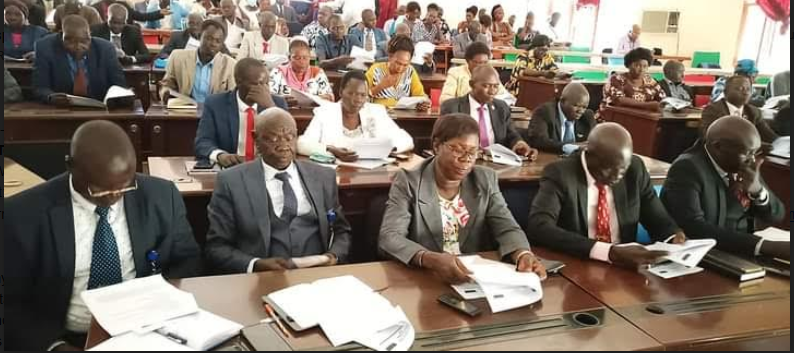The Eastern Equatoria State Legislative Assembly on Wednesday went on a three months recess after holding 36 ordinary and 12 extraordinary sittings in its first session.
In the last three months, the state assembly amended and passed the Conduct of Business Regulations Act and severally deliberated on matters of insecurity including most recently that in Magwi County. The house also rejected the reduction of examination centers by the national education ministry.
Speaking during the closing of the assembly, Speaker Severino Maira Janus, faulted the state finance minister for failing to present the financial statements for the 2021/2022 fiscal year in spite of demands from the house and said they expect better in the next session.
“We recommend that the state ministers prepare and present the policy frameworks for the year 2022/2023 during the beginning of the second session,” he said. “Consequently, we expect the 2022/2023 fiscal year budget to be presented immediately when the second session commences as we equally hope the outfit allowances will be ready by the time we return to resume the second session, including emoluments.”
Speaker Maira said that the parliament resolved to purchase vehicles for the constitutional post holders and hoped that the state government will in the near future buy cars for the chairpersons of the assembly’s standing specialized committees and their deputies.
For his part, Governor Louis Lobong urged the parliamentarians to work collaboratively despite being from disparate parties.
“You come from different political parties in this unity government and you must work together as a united team to serve the people of Eastern Equatoria State,” Lobong said. “I have on many occasions stated that your contract with the people of Eastern Equatoria State will always remain, but your contract with the political parties may be temporary. You may decide to leave your political party at any time as it has happened with many before.”
The governor emphasized the need to dialogue for sustainable peace and urged the people to work hard rather than wait for handouts.
“We must respect the sanctity of life and the dignity of our fellow humans. In conclusion, I call on all people of Eastern Equatoria to denounce laziness and embrace the culture of hard work in order to increase our local production,” Lobong advised. “We must stop depending on handouts from charitable organizations and we must embrace self-reliance and produce our own food.”
“Strong and sustainable economies are not built on foreign aid but rather by the hard work of citizens,” he concluded.
Paul Napwon Yonai, the SPLM member representing Kapoeta South said it was the role of the parliamentarians to go and preach peace and brief the people on what they did in the house.
“As members of parliament, our duty and function is to go and tell the people about the policies of the government and particularly the about the revitalized peace agreement,” he said. “We have deliberated and therefore we are going to our constituencies to brief the people about policies we discussed in this parliament.”
He advised his colleagues to go and find out how to mitigate the rampant cattle rustling and insecurity in the state.
“One of the major issues is insecurity in our counties. We have cattle raiding among the people in greater Kapoeta, Lopa/Lafon, Ikotos,” he said. “There are also pockets of conflict and we would like members of parliament to go and find how to bring peace among our people.”




